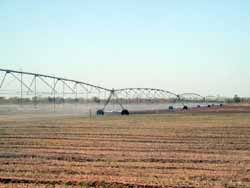
A new British-owned farming venture is spearheading the Gambian government's drive to substantially reduce the West African country's dependence on imported vegetables and other staple consumables and replace them with home-produced food.
High demand for crops like potatoes and onions, farm-gate prices much higher than those in Europe plus attractive tax exemptions for potential agricultural investors in the former British colony have helped secure grant aid for the business from the EU, while significant further investment-led expansion is projected.
So far, Aqua Farms Co. Ltd – founded in 2002 - has successfully developed almost 100 hectares of land for the production of onions, potatoes and specialist vegetable and salad crops for Gambian consumption, and currently employs nearly 200 local people.
Scheduling expansion to 400 hectares within three years, the company has already been approached by President Jammeh of Gambia to manage a further 5,000 hectares of farmland. It also plans to institute farming co-operative to provide direct input support and expertise in areas such as agronomy to local Gambian producers and to market their produce.
Aqua Farms' founder and major shareholder, Gordon Brett, said the Gambia currently imports 90 per cent of its 50,000 tonnes annual consumption of onions and 100 per cent of its 12,500 tonnes consumption of potatoes from Holland: "The government is strongly committed to substituting these imports with home- produced food. Our plan is to reduce the food import bill of the
Gambia by £10 million annually from our own production. We have strong backing from Europe and the Gambian government and it is expected import taxes will be raised to further enhance our competitiveness."
In addition to Gambia's historical links with Britain, its continued membership of the Commonwealth and its stable democracy, he stressed Aqua Farms' considerable financial and operational advantages: "Private consultants from the UK have extensively researched the project. The EU studied their findings and has grant aided the project. We consider this to be a valuable endorsement of the sustainability and suitability of the business.
"Aqua Farms are holders of a 'Special Investors Certificate' issued by the Gambian government giving significant advantages with duty and tax waiver. It means we have exemption from import taxes, duty and company taxation for five years, because agriculture is given high priority to foreign investors. In addition, the Gambia has a special business relationship with the UK over repatriation of funds, which means profits can be repatriated with no limits."
He said new investors would be highly attracted by the farm-gate prices for crops such as potatoes (£190 - £505 per tonne), onions (£160 – £420 per tonne), iceberg lettuce for which Aqua Farms is the exclusive supplier (30p – 55p per head, with consumption estimated at 200,000 head) and cabbage (£400 per tonne, with consumption approx. 35,000 tonnes).
Operationally, Aqua Farms benefits from a plentiful supply of fresh water for irrigation, from its 84m boreholes, providing the farm with its requirement for 150 cubic metres per hour – a unique facility in Western African agriculture. The farm's location also has the opportunity to recruit from a large locally-based labour force, which can expand to more than 1000 from the local population.
The region's climate allows for three crops per year of onions and two of potatoes, plus all year round production of specialist crops. Aqua Farms has invested substantially in advanced irrigation systems for use during the October-June growing season. With its limitless supply of water it makes extensive use of centre pivots, lay flats, sprinklers and misters connected to more than one hectare of propagation tunnels.
The soil is ideal for vegetable growing, being light-textured sandy loam with good natural drainage, and being acid (pH 5.6-6.5) is particularly suitable for potato crops. In addition to the high-volume vegetable crops, Aqua Farms also grows groundnuts and maize during the wet season from July to September.
A huge market for agricultural produce (plus market opportunities in neighbouring Senegal), inexpensive and widely available land, plus modern communications and transportation make Gambia increasingly attractive for new investors, the latter including regular flights from the UK to its international airport and one of the best sea-ports in West Africa.
Outlining the business's achievements to date, Gordon Brett said Aqua Farms had successfully grown and sold its products at the expected prices. In addition it had installed the Gambia's first centre pivot irrigation system and has become the country's sole agent for supplying centre pivots from the world's largest manufacturer.
Ancillary business activities include Gambia's first subsidised food retail outlet for local people, a profitable venture in its own right, with more of these outlets planned in future.
Gordon Brett said: "Gambia represents a vast new opportunity for agricultural investment with the potential for enormous business growth. The entire start-up costs for the business were provided by myself, including the EU funding. Now we are seeking an investor to inject £50,000 - £100,000 to accelerate our expansion and enable us to take advantage of the many lucrative opportunities we have been offered. We are completely committed to continuing the successful progress we have made and extremely confident that we will achieve and, in fact, exceed our stated objectives in this very exciting venture."
